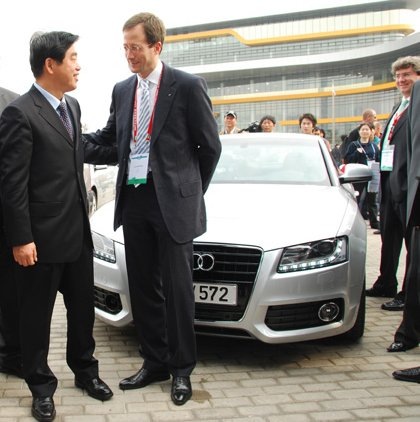
Audi clearly demonstrated the efficiency and clean emissions of their TDI power-train system last week when the new A5 TDI was declared the overall winner in the prototype vehicle class of the Challenge Bibendum in Shanghai last week. They used their experience with efficient high-performance diesels to create the A5 coupe that was powered by the latest version of the 3.0L V-6 diesel equipped with the urea injection exhaust after-treatment system. The A5 TDI finished first overall the handling, acceleration and emissions categories and did well enough in other areas to capture the class victory. In the fuel consumption tests, the A5 managed 40.6 mpg (US) which is pretty respectable for a mid-sized sport coupe.
That same engine and exhaust system will be installed in the new A4 and Q7 TDI models that are coming to the U.S. in 2008. The A4 and Q7 will be fifty-state legal under the Tier2 Bin5 standards. In addition to the A5, Audi also ran an A6 wagon with the 2.7L V-6 TDI and an A3 with the 1.9 TDIe. The A6 had a mild hybrid system that helped it achieve 50.2 mpg in the fuel economy test which was only good enough for 25th place in the prototype class. The A3 pulled out a 62.2 mpg result in the production class which earned it fourth place behind the Mercedes E300 Bluetec, VW Passat Bluemotion and BMW Hydrogen 7.
[Source: Audi, thanks to Christian for the tip]
Ingolstadt, 2007-11-22
Victory for Audi in the Michelin Challenge Bibendum
Victory for the cleanest diesel in the world
- TDI now demonstrates its superiority in Shanghai
- Minimal emissions with ultra low emission system
- Impressive combination of efficiency and dynamic performance
The TDI has again demonstrated its superiority as an engine concept that combines efficiency, low emissions and dynamic performance. In the Michelin Challenge Bibendum, the world's leading test and showcase event for sustainable mobility, the Audi A5 3.0 TDI with ultra low emission system finished first in the prototype vehicles category – ahead of a strong field of competitors, many of them vehicles with hybrid drive or powered by fuel cells. The three vehicles entered by Audi scooped a total of nine awards.
The Challenge Bibendum Rally, which this year was staged in the Chinese metropolis of Shanghai, was the context in which consumption, emissions, driving safety and handling characteristics were all assessed. After all its qualities had been taken into account, the Audi A5 3.0 TDI emerged ahead of its challengers. It came out on top in the categories Handling, Acceleration and Emissions. This achievement was squarely attributable to the technology that makes the TDI the cleanest diesel in the world – its ultra low emission system. Though the Audi A5 was entered in the Prototypes category in Shanghai, this system is virtually ready to go into production: the Audi A4 and Audi Q7 will be the first car lines to feature the 3.0 TDI with ultra low emission system, due to go on sale in 2008 in Europe and the USA.
Various engine measures optimise the combustion process and with it the untreated emissions; an exhaust aftertreatment system cuts nitrogen oxide emissions by up to 90 percent. The new high-tech TDI engines already comply with the emission limits that will probably apply in Europe from 2014, and satisfy the toughest emission limits in the world – the LEV-II BIN-5 standard that applies in five US states.
The Audi A3 Sportback 1.9 TDI e demonstrated in the Michelin Challenge Bibendum just how efficient the standard TDI models of the brand with the four rings already are: its consumption was clocked there at an average of 3.78 litres per 100 kilometres. Audi presented the prototype A6 Avant 2.7 TDI, with yet more near-series technology on board in the form of two intelligent energy management modules. A microhybrid recovers energy during braking and freewheeling, and a start-stop system switches the engine off at traffic lights. The V6 diesel that propels the large Avant with 132 kW (180 bhp) of power thus achieved an excellent average fuel consumption of 4.68 litres per 100 km. The Audi A5 3.0 TDI with ultra low emission system achieved a reading of 5.79 litres/100 km. In view of its very dynamic performance, this too is an excellent figure.
"We will be cementing the position of the TDI as a highly efficient form of propulsion," said Axel Strotbek, member of AUDI AG's Board of Management with responsibility for Finance and Organisation, in Shanghai. Wan Gang, Minister for Research and Technology of the People's Republic of China, and Hu Yanzhao, Deputy Mayor of the city of Shanghai, also took the opportunity to find out more about TDI technology and its pioneering significance at the Challenge Bibendum.
The TDI is a cornerstone of Audi's global strategy for the future; it combines superior power with low fuel consumption. Audi is therefore currently drawing up a scenario for launching its TDI engines, the most successful efficiency technology in the world, on the Chinese market. TDI engines are capable of harnessing escalating fuel consumption specifically in China, and therefore also CO2 emissions. Diesel-powered passenger cars have hitherto been virtually unknown in China; the introduction of the low-sulphur fuel that they require now satisfies a vital requirement for the operation of modern, low-pollution TDI engines.


Sign in to post
Please sign in to leave a comment.
Continue